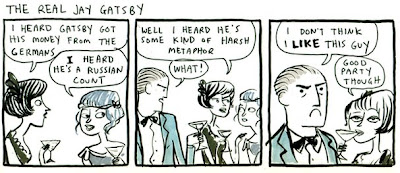One of the funnier scenes in The Great Gatsby takes place at an impromptu party thrown by Tom's mistress Myrtle Wilson. When Myrtle and her sister Catherine argue over why she married George Wilson, the following exchange takes place:
takes place at an impromptu party thrown by Tom's mistress Myrtle Wilson. When Myrtle and her sister Catherine argue over why she married George Wilson, the following exchange takes place:
“I married him because I thought he was a gentleman,” she said finally. “I thought he knew something about breeding, but he wasn't fit to lick my shoe.”
“You were crazy about him for a while,” said Catherine.
“Crazy about him!” cried Myrtle incredulously. “Who said I was crazy about him? I never was any more crazy about him than I was about that man there.”
She pointed suddenly at me, and every one looked at me accusingly. I tried to show by my expression that I had played no part in her past.Recently, while skimming through the novel (yet again) I came across that same scene and something didn't seem right to me - there was something off in the flow, particularly in the last line. I looked up the text online (thank you, Project Gutenberg Australia) and sure enough there it was - the version on the screen was as I had remembered it, while the the last line of the version in my hand read:
This line appears in the Penguin Popular Classics edition of the book, which is unavailable in the US since it is the only place in the world where the copyright for this work has not yet expired (I mean, come on, the book was published 85 years ago and the man's been dead for 70 of those years, but this isn't a post about unreasonable copyright laws). I had purchased the penguin edition as a second copy, in addition to the Scribner edition I already had, for reasons far too idiosyncratic to go into without making me seem like a loon.She pointed suddenly at me, and every one looked at me accusingly. I tried to show by my expression that I expected no affection.
Additional research on Google Books revealed that the latter version of the line also appears in the Wordsworth Classics edition, and the Oxford World's Classics edition, (both editions also relied on the work's expired copyright for publication), while the "original" line appears in the Scribner edition (Fitzgerald's original publisher) and the "definitive" Cambridge edition.
Further snooping (can you tell I'm avoiding work?) also points to which of the two lines came earlier. In Trimalchio: An Early Version of the Great GatsbySo it seems the Penguin version is probably earlier than the Scribner version, halfway between Trimalchio and Gatsby. This change from the earlier version to the later one makes complete sense to me for three reasons:She pointed suddenly at me, and everyone looked at me accusingly. I tried to show by my expression that I expected no affection whatsoever.
- The Scribner version sounds far better than the earlier one, which in such a short line managed to throw in two distracting elements - a clumsy alliteration (expression/expected) and an accidental rhyme (expression/affection).
- The Scribner version makes more sense - at this point in the narrative Nick, the narrator, is trying to defuse the situation, so the clearest approach would be a statement of fact - he played no part in her past - rather than exploring his expectations, which are quite irrelevant for the assembled crowd.
- Finally the Penguin version tries too hard to be funny - it's too cute, and this comes at the expense of both the flow of the narrative, and Nick's character as we've come to know him.
And while we're on the subject of Fitzgerald, here are a few (somewhat) related recommendations:
- Tender is the Night
, which Fitzgerald wrote after The Great Gatsby, also exists in two versions - after the original, published in 1934, failed commercially Fitzgerald thought about revising it (essentially to make it more accessible by constructing the narrative chronologically) and discussed this notion with his friend (and noted critic) Malcolm Cowley. In 1951 a second version, edited by Cowley and based on Fitzgerald's revision notes, was published posthumously. Scribner publishes the original version and Penguin publishes the second
. Unsurprisingly, I recommend reading the original Scribner version.
- The comic above is part of a whole series of Gatsby strips from K. Beaton's excellent comic Hark! A Vagrant, which also features Pirates, Hipsters, Tudors, Napoleon, Franklin, Poe, Jane Austen, and James Joyce, among others. I encourage everyone to check it out.
- The Cambridge Editions of F. Scott Fitzgerald's works
are beautiful, well-researched, thoughtfully composed, and often ridiculously expensive (Trimalchio
is only $12.40, but This Side of Paradise
and Tales of the Jazz Age
are a whopping $115.00 each!). If anyone from Cambridge University Press is reading this, I'd love a review copy of each volume, I promise I'll write nice things (or, if you prefer, I can write bad things about Oxford).





![Darkness at Noon [Books That Have Changed Man's Thinking]](https://images.gr-assets.com/books/1327243764s/13349640.jpg)







No comments:
Post a Comment